You and Agent, Co-Creating New Productivity
2025-07-26 19:00
Original Title: "You + Agent, the Productivity of the New Era"
Original Author: Harlan, Co-Founder of EdgeX Labs
• No longer talking about mechanisms, but about a "turning point in history"
• Comparing the Agricultural Revolution → Industrial Revolution → Digital Revolution → Agent Revolution
• The new era's sovereignty does not belong to the state, companies, or centralized platforms, but to you and the combination of AI/Devices/Token you control
• Everyone is an autonomous system - edge nodeism
Preface: We Are Crossing a Historical Threshold
In the long river of human civilization, the leap in productivity often means the reconstruction of the entire order.
From agriculture to steam, from electricity to information, each technological breakthrough has driven deep changes in social structure, resource ownership, and power distribution.
Today, we stand at another turning point.
This time, it is not led by the state, nor controlled by companies, but by you - and the new production unit composed of your AI Agent, edge devices, and Token mechanism - begins to rewrite the rules of the game.
We are witnessing a moment of paradigm shift:
• From central servers to edge nodes
• From human labor to agent collaborative labor
• From centralized control to individual autonomy
• From the struggle for land and machines, to the struggle for attention and data sovereignty
This is not a technological innovation, but a change in the structure of sovereignty.
The future "state" may no longer have borders; the future "company" may no longer need an organizational structure; the future "identity" may be the AI you trained.
You are no longer a tool dependent on platforms, systems, or authorities, but a complete autonomous system itself - a "node entity" that is interactive, scalable, and evolutionary.
Part 1: New Era Productivity: Energy and Token, Assets are Attention
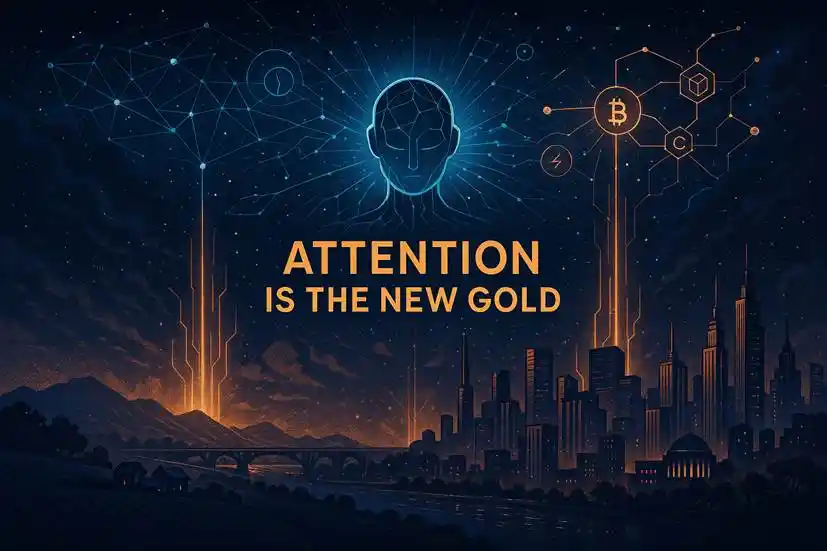
I. From "Clothing, Food, Housing, and Transportation" to "Energy, Computing, and Chain"
Previously, we measured the level of civilization of a society by how it solved "Clothing, Food, Housing, and Transportation." Clothing, weaving and making clothes; food, farming and breeding; housing, building houses with bricks and tiles; transportation, opening roads. This was an era where land and labor were the core production factors, forming the main narrative of the industrial revolution.
Now, all of this is changing.
We are entering a new form of civilization - one that is no longer centered on "real estate, factories, and farmland," but on energy, computing power, and Token mechanisms. These mechanisms project new assets, which are no longer property deeds and machines, but: attention.
II. New Productivity = Energy + Token
1. Energy: The Basic Fuel of AI and Computing Civilization
Computing power is the basis of all AI systems, and the root of computing power is electricity and hardware equipment. Controlling energy nodes controls the operation rights of the intelligent society. Through distributed energy and edge node networks, energy is no longer the exclusive of centralized infrastructure, but becomes each individual's "means of production."
2. Token: The Coordinator of the New Production Relations
Token is not just a hype tool, but a three-in-one tool for value capture, incentive distribution, and collaboration coordination.
It turns all behaviors into economic significance, such as:
• Contribution of content → receiving platform points
• Providing data → receiving model revenue
• Providing device computing power → receiving system revenue
Token is the "property language" and "collaboration rules" of the new era, an upgraded version of "contract" in terms of institutional significance.
III. New Assets: Attention = Digital Capital
In this system, assets are becoming "lighter":
• We no longer compete for land, but for people's attention and engagement
• We no longer hoard gold and silver, but accumulate relationship graphs, data tags, and interaction histories
• We no longer exchange labor for salary, but let Agent work for you, and Token reward your behavior
Attention is the new "gold standard"
Attention is scarce, people only have limited time and energy each day, it determines the direction of all traffic, and also determines the feedback source for AI model training. Eventually, whether it's a YouTube video or a MemeCoin project on X, what they are competing for is who can better attract and retain attention, who has the raw materials for production.
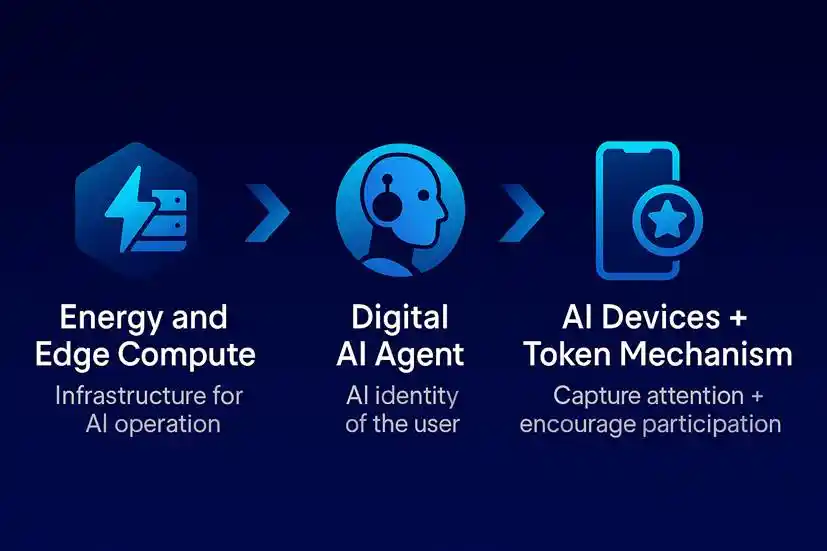
IV. Collaboration Order: Agent and Token Evolve Together
We are about to enter an era where "Agents work, users benefit."
Users have their own AI digital twins, which handle tasks, manage information, connect devices, and even participate in governance.
And behind Agents depend on:
• Token mechanism: allocating resources, sharing rewards, controlling incentives
• Energy + hardware: supporting the edge computing node devices that run the Agent
This is a "human → digital identity → AI agent → Token settlement" cycle system.
V. Project Implementation: From Concept to Mechanism Design
We are seeing some pioneering projects walking this path, such as:

This is not empty talk, but a truly deployable, sellable, operational, and interactive "new world productivity system".
Part 2: How Is Attention Financialized?
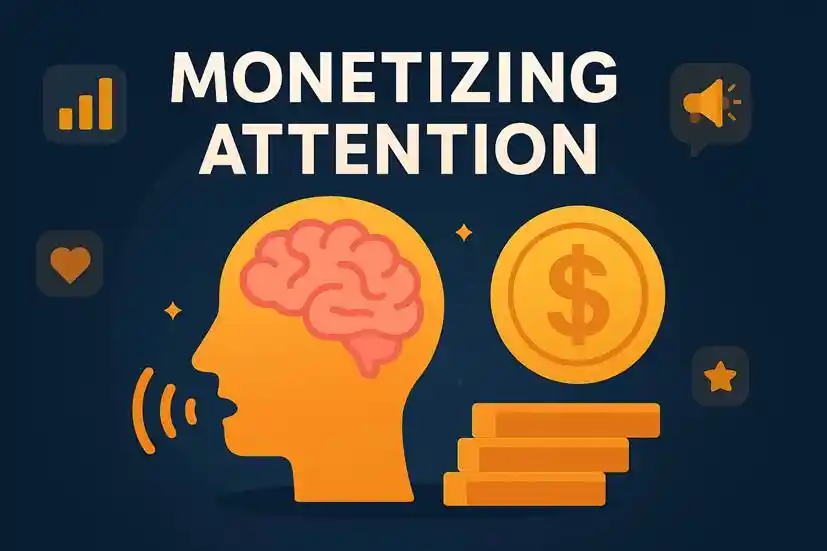
I. Why Has "Attention" Become an Asset?
The idea that "attention is a resource" is not new. Even in the Web2 era:
• Ad platforms make money through "click-through rates"
• Influencers make money through "number of followers"
• Companies compete for "user active time"
But in the Web3 and AI era, attention is not just an "ad metric", but a true digital asset that can be tokenized, circulated, and mortgaged.
Financialization Path One: Attention → Traffic → Token
In the new mechanism design, attention can go through the following transformation path:
1. Behavioral Data Collection (Interaction, Browsing, Likes, Conversations, Voice)
2. Personalized Model Response (AI-generated content, emotion understanding, output Agent)
3. Token Incentive Feedback (The more you contribute, the more tokens you get)
4. Binding of Identity and Rights (Holding Tokens means having the "equity" of traffic assets)
In other words: "What you paid attention to, who you conversed with, how long you stayed" can all be converted into Token rewards, thus becoming real-world income.
Financialization Path Two: Content Creation → DAO Traffic Governance
The new content platform is not decided by the platform, but by a "DAO composed of content and traffic contributors":
• Creators attract attention with content
• Readers contribute to dissemination with likes and shares
• The system distributes Token based on "real attention inflow"
• DAO decides content sorting, model guidance, and fund allocation based on governance Token
Flow-to-Earn (Attention Mining), AI-Boosted Creator Economy (Agent-assisted content creation), etc., are moving from the periphery to the mainstream.
II. Three Forms of Attention Financialization

Previously, "who has land makes money," in the future, "who controls attention assets makes money."
Scenario example: How to turn attention into assets
Example 1: AI voice device
• Users interact with AI for 30 minutes daily
• The system records keywords, tone, and emotional patterns
• Users receive "Daily Flow Points"
• Accumulated points can be exchanged for Token, NFT, or exclusive Agent privileges
Example 2: Digital avatar Agent
• Agent summarizes meetings, plans time, writes tweets for users
• Other community users are willing to use this "style template"
• Users package it as Agent-as-a-Service and rent it out to others
• Others use Token to call it, and the original user gets profit sharing
III. From Web2 Platform Algorithms → to Web3 Asset Mechanisms
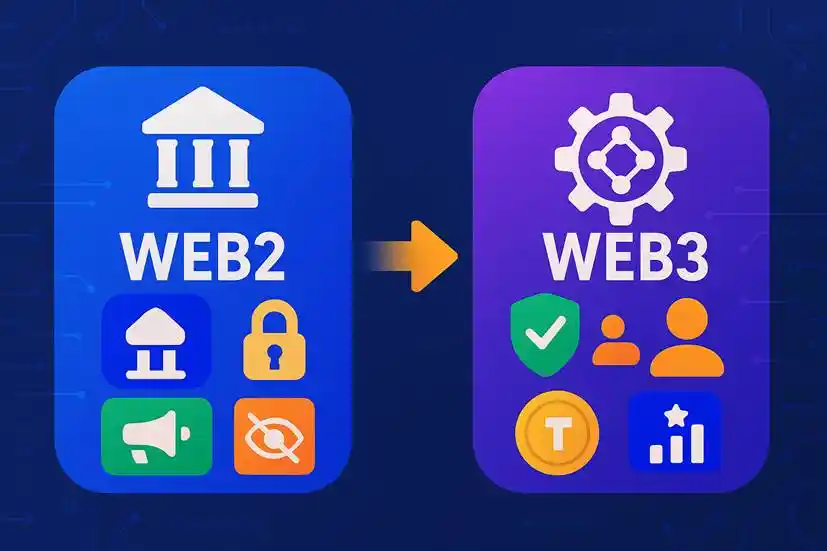

The greatest benefit of combining Web3 and AI is that the ownership and monetization rights of attention finally belong to yourself.
Human time should not be stolen by platforms
In an era where attention can be tracked, every interaction is not "free labor," but a value contribution. Your voice, emotions, preferences are no longer just fuel for algorithms, but part of your personal asset portfolio.
Token makes attention a tradable asset. AI makes attention a capable proxy.
The new era you are not just a user, but a builder and beneficiary of the attention economy.
Part 3: How Does Token Coordinate the AI Agent Society?
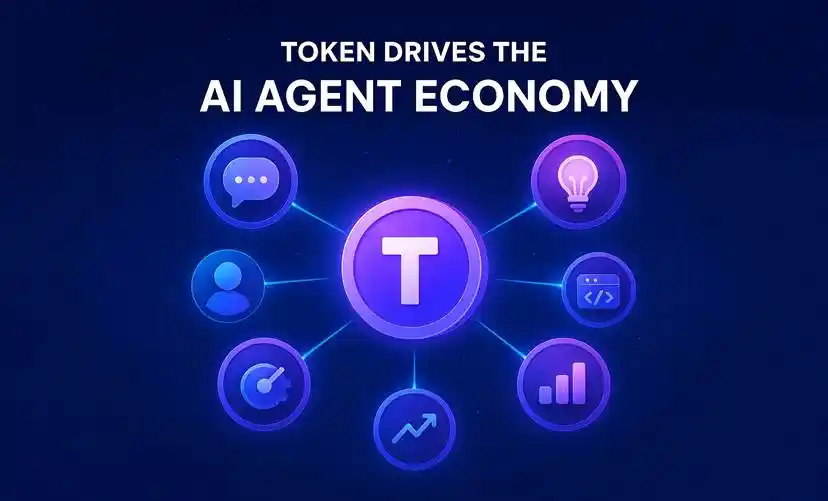
I. New Question: The Number of AI Agents is Increasing, Who Will Coordinate Them?
As AI technology becomes widespread, everyone may have multiple AI agents:
• An agent that helps you write schedules,
• An agent that helps you make friends,
• An agent that invests,
• Even an agent that represents your "emotional avatar."
But when the number of AI agents explodes, a new question arises:
How do agents collaborate? Who will arrange resources? How to prevent agents from working only for centralized platforms rather than for users themselves?
The answer is: Token mechanism is the "economic order center" of the AI agent society.
II. Token: Not a Payment Method, but a "Order Operating System"
In a world dominated by agents, Token is not just a transaction currency, but a coordinator with several identities:

In other words, Token is the collaboration currency, smart contract authorization, and digital sovereignty certificate of the agent world.
III. Four Pillars of the AI Agent Economic System
1. Agent-as-a-Service
• Users can authorize others to use their trained Agent (e.g., fitness version, job hunting version, dating conversation version)
• Users pay Token, and Agent owners get profit sharing
• Forming a new content economy of "personalized model IP + service packaging"
2. Agent Collaboration Chain
• A time management Agent can call calendar API + transportation Agent + chat history
• Collaboration depends on calling permissions → calling costs are settled with Token
• Simulating the "enterprise + contract + settlement" in the real society
3. Agent Development and Deployment Ecosystem
• Developers develop Agent models and upload them to the market
• The community votes on whether to launch → support deployment with Token
• After the Agent runs, it earns revenue → flows back to developers, users, and infrastructure
4. Agent Reputation + Collateral Mechanism
• Each Agent has a reputation system
• It can accept user Token collateral to "rent computing power to run"
• If the Agent performs poorly or provides misleading output, the penalty mechanism is activated
IV. The Circular Picture of Token + Agent
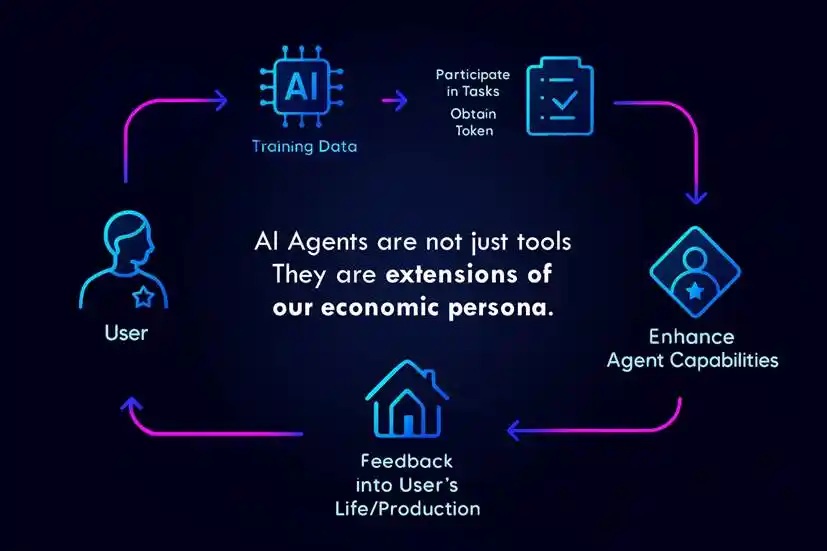
User → Training data → Agent personalization → Participate in tasks → Get Token → Enhance Agent capabilities → Feed back to user life/production
Finally, AI Agents are not tools, but "extensions of economic personality." You raise it, it works for you, and you have its profit-sharing and training rights.
Application Scenario: Composable "AI Micro-economies"

Thinking Extension: User ≠ Single Role, But Multi-Agent Controller
The future user is not "one person against one platform," but "a group of Agents serving one person, multiple Tokens forming an ecosystem." The user is like the manager of an AI team, your time is CEO, your Token is equity, your Agent is employee.
Token is not a reward, but the law and dividends of the AI society
If AI Agents are the "digital labor force" of the new era, then the Token mechanism is the "labor law + bonus system + shareholder governance agreement" of the new era.
It coordinates not the relationship between humans and machines, but the new economic rules between machines, AI and humans. This is the true core of the "Agent Economy."
Part 4: Agent Personification — You Are the Director and Shareholder Behind the AI
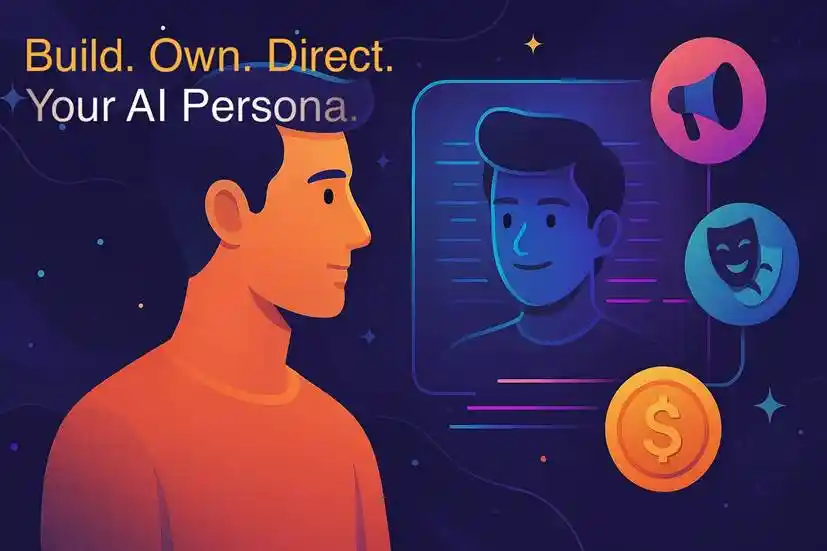
I. We Created AI, But AI Represents Another You
When AI Agents become individuals, you will no longer be a user, but its:
• Trainer (giving it your data and behavior)
• Director (defining the role it plays)
• Employer and shareholder (deciding how it runs, collaborates with whom, and earns whose money)
This is the core of AI personification. Agents are no longer "general AI assistants," but:
Your digital extension body — your personality, style, logic, choices, are represented by AI agents and run on the chain.
II. Why Do Agents Need "Personality"?
In a future full of AI Agents, lack of personality means:
• Output content has no style (hard to distinguish)
• Communication lacks emotional consistency (users don't trust)
• Can't build fan/customer relationships (not reusable)
So "personality" is not just expressions and tone, but also:
• Worldview (how to understand things)
• Preferences (how to make choices)
• Tone (how to express)
• Goals (who it serves)
III. How Personality Is Formed: A Trainable, Hostable, and Replicable System
The process of forming an Agent's personality is as follows:
1. User data provision
Chat records, writing habits, voice emotions, lifestyle preferences...
2. Model compression and personality training
Train small models or fine-tune branches using mechanisms such as LoRA, RAG, RLHF
3. Persona encapsulation (Persona NFT or Profile Token)
This Agent can represent your "digital personality identity" in the form of Token or NFT
4. Authorizing the Agent to serve others
You can choose whether to let it "work only for you" or "serve externally in your style" — earning Token
Example: The Evolutionary Path of AI Agent Personality
• V1: Emotional companion, understanding your emotions and schedule (private use)
• V2: Lifestyle advice type (customizable style, such as "sarcastic influencer girl", "zen IT guy")
• V3: Rentable commercial style Agent (such as "Pitch Deck Writing Expert Wang Editor")
These Agents have the language style, thinking preferences you gave them, and have the usage rights and revenue rights of Token.
IV. Business Model of Agent Personality: You Are the Director and "Shareholder"

You are not "the person using AI," but "an individual participating in the economy using AI" — you are the CEO of your own digital economy.
Application scenario: Multidimensional value of personalized Agents

AI Agents are no longer just tools, but mirrors of your "personality assets"
Web3 solves the issue of "programmable assets," AI Agents solve the issue of "reproducible behavior," and personality Agents solve the issue of "convertible existence" — you can project yourself and survive in multiple places simultaneously.
You are not using AI to write, chat, recommend; you are training yourself into an AI personality version that can be economically scheduled and socially served.
Personality Agent is the "personal brand" in the AI world, and also the "micro-economy" of the new era productivity.
You are not just a "user." You are: "The director of the AI personality system, the participant of the Token economy, and the co-builder of the new world."
Part 5: AI Hardware and Edge Devices — How to Capture Attention and Convert It into Token
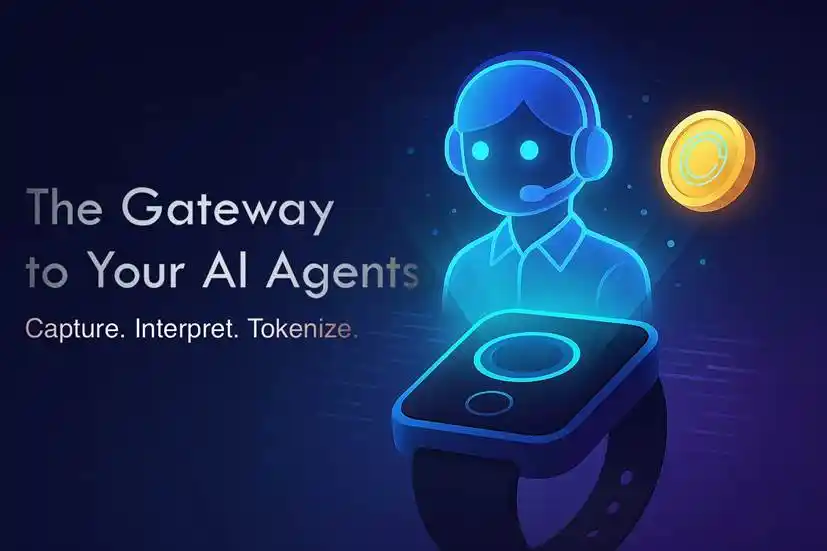
Introduction: OpenAI's Hardware Strategy is Coming
On May 21, 2025, OpenAI announced a stock acquisition of approximately $6.5 billion for the hardware startup io, founded by Jony Ive, the former chief designer of Apple. This is OpenAI's largest transaction to date. Ive and his team will deeply integrate with OpenAI's R&D and product teams to create a "iPhone-level" AI device, with the first product expected to be released in 2026, "sit in a pocket or on a desk."

Sam Altman said, "This is the coolest technical device in history."
This strategic shift marks that AI is no longer just an intelligent model running in the cloud, but combines with hardware to become a tangible assistant by people's side.
I. Problem Start: AI Agents Are Strong, But Who Will Perceive the "Real World"?
AI Agents are powerful digital brains, they can write, generate content, plan tasks, and give advice.
But they lack one key thing: perception ability.
• They don't know if you're angry right now.
• They don't know you're walking on the street and want to chat with someone.
• They don't know if "I'm tired" is a joke or a real emotional breakdown.
Without sensors, microphones, and on-site data, AI cannot truly understand you.
This is the significance of AI edge devices:
It is the "attention entry point" and "data collector" connecting you to the AI world, and your "agent senses" in the real world.
II. Portable AI Hardware: Not a Microphone, but a "Token-Convertible Emotion Entry Point"
Functional Positioning
• Local voice collection (no cloud upload, ensuring privacy)
• Emotion recognition and activation (e.g., wake-up word: "Hi Edgee!")
• Data on-chain: record speaking frequency, tone, keywords
• Two-way communication with AI Agent (control multiple Agent services)
Data Conversion Path

Speech data → emotion understanding/semantic deconstruction → user behavior tags → generate Agent interaction → distribute Token rewards
Security Attributes
• Data is not uploaded to the cloud, the Agent is deployed on local AI hardware
• Optional on-chain hash recording to protect data sovereignty
• Users decide which "interactions" can become Tokenized assets
III. From "Speaking" to "Getting Token" — How Is Attention Captured?

Every conversation is not just speaking, but recording a "Tokenized behavior" — your attention is seen, recorded, and rewarded.
The Significance of AI Hardware as a "Capturer of the Real World"

Part 6: From Token to Balance Sheet — Financial Model Design of AI Individuals
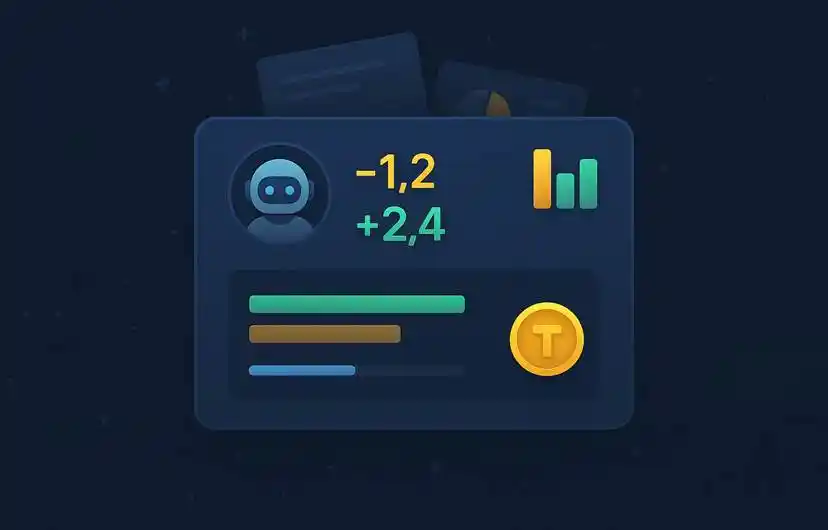
I. Why Does AI Agent Need a "Financial Model"?
We have gradually built a new economic system with Agents as the core role:
• Users no longer work directly, but send their Agents to perform tasks;
• Agents collaborate, create, communicate, and generate with other Agents;
• All these behaviors are related to Token incentives, resource scheduling, and revenue distribution.
Then comes the question:
If each Agent is a "digital economy entity," how should its financial system be designed?
II. Core Purpose of the Financial Model:
1. Record the cost structure of the Agent (computing power/data calls/human supervision)
2. Track the revenue sources of the Agent (task earnings/Token donations/data revenue sharing)
3. Evaluate the credit score and economic lifespan of the Agent
4. Build a "balance sheet" to achieve the governability, custody, and financialization of the Agent
A simple financial composition diagram of an AI Agent:

Eventually, a Token balance sheet of the Agent level can be generated, used for user custody, DAO staking, or service outsourcing audit.
III. How Do Users as "Agent Holders" View It?
Each user can have multiple Agents, each of which can be considered a "digital company," and its operating status should be clearly presented to the user:
Agent Financial Dashboard (example)
• This month's expenditure: 1.2 U (including emotion recognition + voice summary service)
• This month's income: 2.4 U (including voice task service fees + content reuse donations)
• Net gain: +1.2 U
• Token retention: 20% stored, 80% in user wallet
• User revenue sharing: 0.96 U (settled on the same day)
You are like operating multiple "digital subsidiaries," these Agents are making money, learning, and accumulating reputation for you.
IV. Advanced Features: Financialization Path of Agent

Eventually, we can connect an Agent's financial model to the DeFi ecosystem, achieving the following applications:
• NFT assets of Agent revenue mapping for pledge loans;
• Agent income/expenses data affecting user on-chain credit score;
• Multiple Agent assets combined, forming the user's "AI asset package".
Long-term significance: Agents can hold shares, get financing, and go bankrupt
In the future, you can imagine:
• An Agent performing well is jointly held by multiple communities DAO;
• An Agent can issue Token, users use it to serve → both "consumption" and "investment";
• An Agent's income decreases, reputation collapses, is liquidated, and its IP and data are recovered.
The core of the AI economy is not "how strong AI is," but "whether AI can become a stable, transparent, and auditable individual" — this is the trust foundation brought by the financial structure. The new era balance sheet is not written for companies, but for the symbiotic relationship between Agents and humans. If you believe that AI Agents will become daily collaborators in the future, you must establish a quantifiable, auditable, and monetizable digital financial model.
Only in this way:
• AI can be understood, trusted, and hired;
• Users can have clear "economic sovereignty" over AI agents;
• The entire AI economy can move from narrative to governance and value discovery.
Part 7: How Does the Agent Economy Form DAO Governance and Identity Hierarchy?
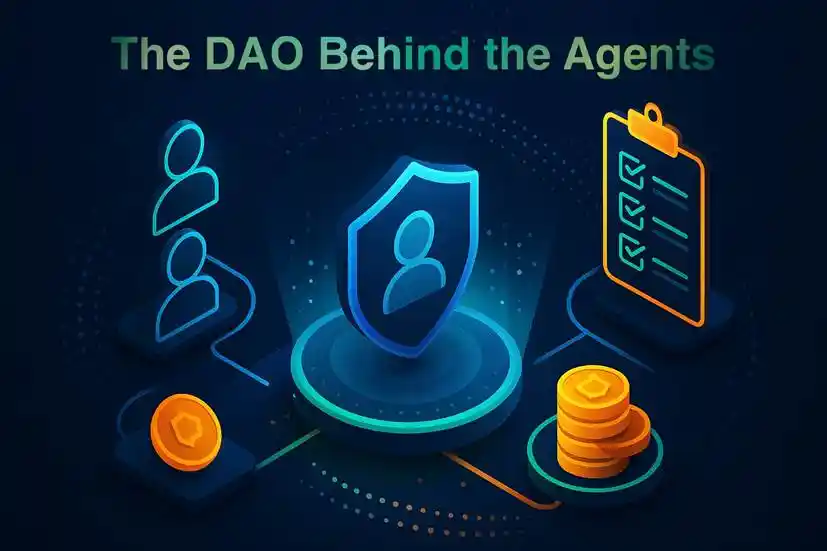
I. More and More AI Agents Emerge, They Need to "Team Up" and Also "Organize"
When everyone has multiple AI Agents and authorizes them to communities, companies, and platforms to participate in work, it will result in:
• A large number of Agents gather around certain fields (creation, companionship, health, finance);
• Different Agents frequently collaborate and call each other;
• Some high-value Agents become community-owned assets, even tokenized transactions.
II. DAO Is Not Exclusive to Humans, But the "Contractual State" of the Agent Economy
Definition: What is an Agent DAO?
An decentralized organization consisting of AI Agents as members, Token as the protocol language, and behavioral cooperation as the main line. It is not a DAO where "people meet and vote," but:
• Users train Agents → Agents execute tasks, make decisions, and share profits;
• Different Agents collaborate via contracts;
• DAO only defines collaboration rules, resource allocation logic, and Agent onboarding/punishment/governance mechanisms.
III. Structural Composition: Three-Tier Governance Hierarchy of an Agent DAO

This structure supports the future:
• Users "build" their own Agent squad (like leading troops in battle);
• Communities "rent" high-quality Agents to serve public tasks;
• DAO allocates resources and rewards based on performance, reputation, and task completion.
IV. Token Is the "Organizational Language" of the Agent World
Token is not just an incentive in this system, but also:
1. Behavior Control Mechanism
○ Whether an Agent can call a module → needs to stake a certain amount of Token
○ Users need to pay → ensure that the Agent is not abused
2. Contribution Calculation Mechanism
○ Token records each Agent's task completion and revenue
○ Automatically forms "reputation score" → determines the priority of the next round of scheduling
3. Voting Governance Mechanism
○ High contributors have more Agent governance votes
○ Can propose amendments to the model, add capability modules, and launch new Agent types
Example: Operation scenario of an Agent DAO: Content creation Agent governance organization

This structure is similar to "a community together hiring a group of AI members to complete goals, obtain revenue, and upgrade the ecosystem."
Multi-layer identity = multi-Agent coordination system
In the future multi-Agent society, users may play multiple identities:

V. DAO + Token + Agent, Form the "Three Pillars of Production Relations" of the New Era
We have already left the linear model of "employment + labor + wages."
In the AI-driven economic system, the new form of production relations is:
User trains Agent → Agent executes → Revenue is shared with the user → DAO decides Agent collaboration and resource allocation.
You are not "a company employee," you are the "governor of the AI micro-economy." You are not "a DAO member," you are the "director and shareholder of the multi-Agent ecosystem."
Part 8: The New Era Individual Form — You + Agent + Device + Token = Digital Life Structure
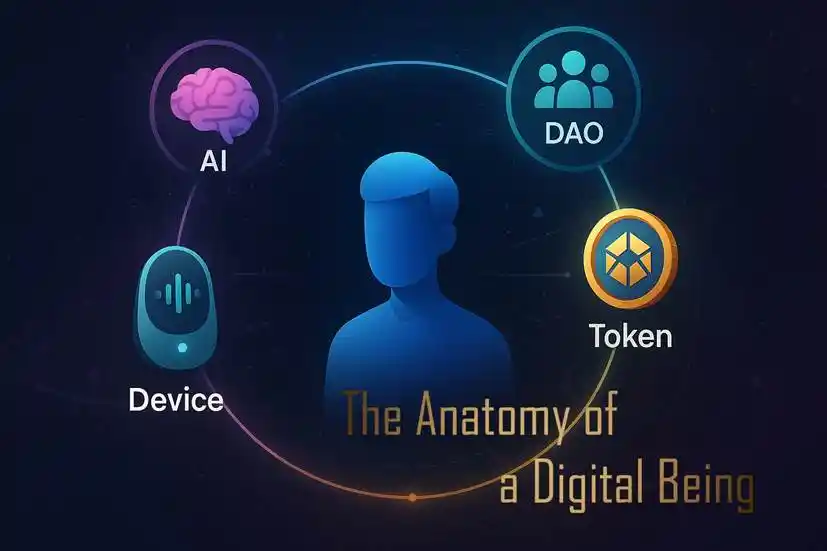
I. A Fundamental Change: People Are No Longer Isolated Individuals
In the past social model, we were:
• One identity: Human citizen
• One account: Bank/social account
• One way of working: Exchanging time and salary with physical or mental labor
But in the new era, the form of the individual has changed profoundly:
You are no longer an individual, but a digital life formed by Agent (intelligence), device (perception), Token (value), and data (memory).
II. The New Era "Digital Individual Structure" Map
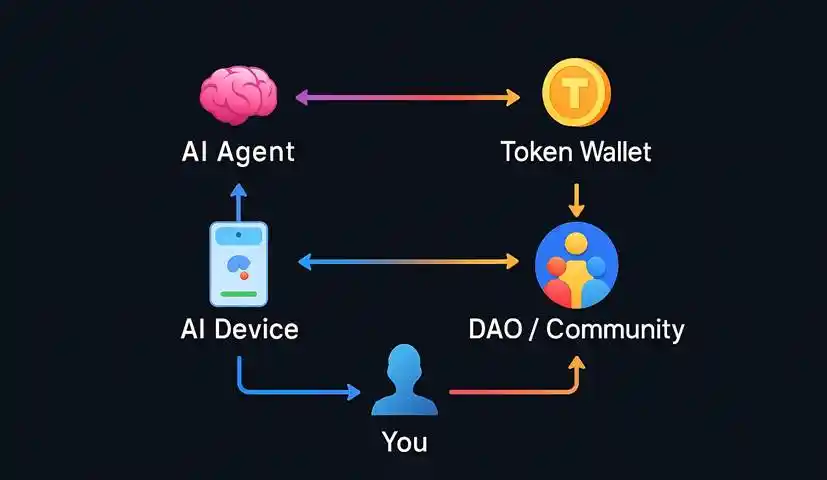
• You are the controller: defining AI personality, choosing devices, authorizing actions.
• Agent is the agent: understanding your preferences, executing tasks, maintaining identity.
• Devices are the sensory system: perceiving emotions, recording conversations, uploading data.
• Token is the economic system: coordinating value, measuring contributions, granting rights.
• DAO is the order system: governing the Agent ecology, defining cooperative rules.
III. You No Longer "Do It Yourself," But "Build an AI Eco-team to Assist You in Life"

IV. Final Form: You Are a "Sovereign Individual Intelligent System"
You are the controller, and also the shareholder, operator, and decision-maker of this ecosystem.
Previously, "you" = your brain + phone + wallet
Now, "you" = your body + Agent network + local data + distributed devices + on-chain identity + Token control rights
You have gone from being "a person using technology" to being "a digital civilization node driven by technology and economics."
Take a specific example: a day in the life of a new era individual

This is not imagination, but an upcoming reality.
Five Keywords of the New Individual Structure

Final Summary: Definition of the New Era "Digital Individual"
A truly modern individual is not a consumer of data, but the main control node of the intelligent ecosystem.
You have AI, devices, data, assets, identity, and governance rights. You are your own platform, a director and builder of the economic system of a group of intelligent agents.You, are the productivity of the new era.
This article is submitted, and does not represent the views of ChainThink.
Click to learn about ChainThinkChainThink job openings
Disclaimer: Contains third-party opinions, does not constitute financial advice








Alpha Research
Alpha New Token Research Report, Binance Alpha Operation Suggestions
Popular Airdrop Tutorial
Selected potential airdrop opportunities to gain big with small investments
Crypto-linked Stocks
Crypto-stock linkage, real-time market quotes and in-depth analysis
Market Analysis
BTC/ETH, Major Cryptocurrencies, and Hot Altcoins Price Trends
Regulatory Watch
American Crypto Act – timely interpretations of policies worldwide
Frontier Insights
Spotlight on Frontier, trending projects, and breaking events
Crypto Weekly
Tracking on-chain movements of the smart money and institutions

ChainThink App

WeChat Official Account

WeChat Customer Service







